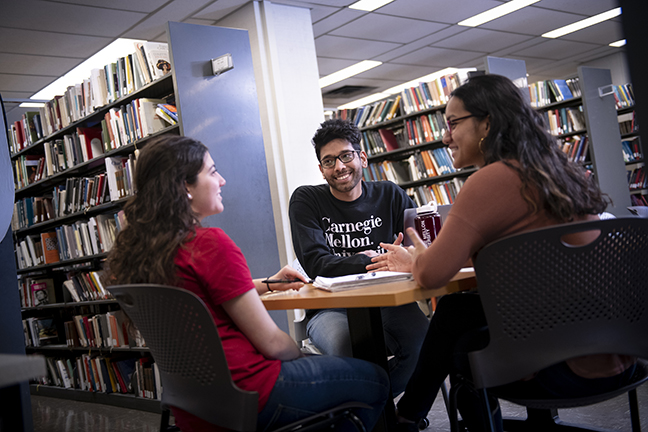
This is the first installment of an annual report to measure progress toward the Libraries’ Diversity Equity & Inclusion (DEI) goals, hold ourselves accountable, and define the priorities for the year ahead.
The Libraries’ finalized its DEI Strategic Plan in spring 2020. However, even before finalization of the plan, efforts were already underway to make progress in its three key thematic areas. As of September 2021, several foundational goals outlined in the plan have been achieved, laying the groundwork for future progress.
DEI Working Group
Guiding this important work is the DEI Working Group, composed of representatives from divisions across the Libraries.
- Katie Behrman, Institutional Repository Specialist
- Jessica Benner, Librarian
- Crystal Johnson, Community Collections Processing Archivist
- Shannon Riffe, Associate Dean for External Relations
- Kelly Woessner, Organizational Development Coordinator
- Leah Zande, Materials Processing Coordinator
As the Libraries’ DEI Lead, Shannon Riffe attends monthly meetings with DEI Leads from the other CMU schools and colleges.
Hiring and Retaining Our Talent
- Kelly Woessner joined the Libraries in July 2021 as its first Organizational Development Coordinator. In this role, Kelly supports the Libraries DEI efforts as well as professional development and HR.
- The DEI Working Group created a framework for regular sharing of information to embed an active commitment to diversity, equity, and inclusion into the organizational culture of the Libraries in order to create and sustain an equitable, supportive, and welcoming workplace.
Building Services that “Serve”
- As part of the Libraries’ website redesign, The new Libraries DEI page was created to highlight the Libraires’ commitment to DEI and the three key priority areas of the strategic plan. Crystal Johnson joined the Libraries as Project Archivist for Community Collections in July 2021. In this role, Crystal is focused on making the Archives’ collections more diverse and accessible and coordinating the Archives’ work with other DEI initiatives in the Libraries and across campus.
- The Libraries’ digital exhibit, “What We Don’t Have,” highlights the absence of diversity in the Carnegie Mellon University Archives. Through the lens of missing collections, the exhibit spotlights everyday tasks of archivists - such as accessioning and processing - and how these activities contribute to the prioritization of some voices over others. It has received over 3,900 views since it went live in November 2020.
- The Libraries Speaker Series presented two speakers who delivered powerful talks on the topic of community archives. These events had a combined 500+ registrants. Harrison Apple’s October 8, 2020 event, "I Can't Wait for You to Die: A Community Archives Critique from the Pittsburgh Queer History Project,” addressed the origins and revised mission of the Pittsburgh Queer History Project as a reflection of the precarious definition of community archives within the field of Library and Archival Science. Watch the video. Bekezela Mguni’s February 25, 2021 talk, “Reclaiming Cultural Stewardship and Decolonizing the Archives,” discussed what it means to approach the practice of archiving through a justice-centered lens. Watch the video. Materials Processing Coordinator Leah Zande curated ten physical and digital book displays, collecting a range of Libraries resources around a specific monthly theme. DEI-related topics included Juneteenth, Pride Month, and Accessibility Awareness.
- Jessica Benner and Katie Behrman created a Libraries DEI Research Guide that includes links to campus resources, collections highlights, and featured events, among others. Also included are resources for educators, for students, and different populations.
Provisioning Equitable Access
- The Libraries launched a redesigned website in August 2021. The development of the site incorporated best practices for accessibility and a third party vendor began a WCAG 2.0 AA accessibility review in September 2021 to ensure that the site complies with federal mandates for accessibility. The review is currently underway at the time of publication.
Looking Ahead
Below are some of the preliminary objectives identified as priorities for the coming year.
- Libraries DEI Dashboard: Create, maintain, and share an internal, interactive dashboard tracking Libraries DEI efforts to promote transparency and accountability around this work. Amplify Impact through Partnerships: Expand the reach of the Libraires DEI work by partnering on programming with other schools and colleges as well as the central Office for the Vice Provost for DEI and Chief Diversity Officer.
- Embed DEI Practices into Hiring, Onboarding and Training: Organizational Development Coordinator Kelly Woessner will lead efforts to standardize processes for hiring and professional development. Policy Creation: Develop and implement new policies for accessibility, workshops, instruction, and events in physical and digital spaces.
- DEI and Distinctive Collections: Create an internal process document for how we describe and provide access to materials we steward that includes how we deal with offensive historical language.
